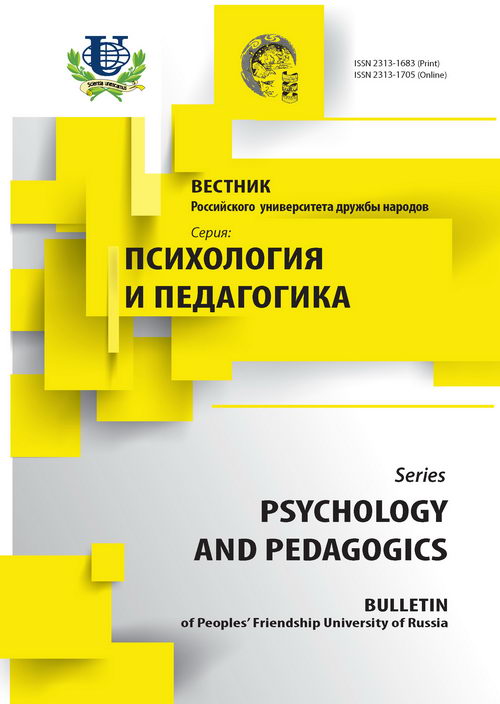Межкультурная адаптация к России студентов из Азии, Африки, Латинской Америки и Ближнего Востока
- Авторы: Чеботарёва Е.Ю.1
-
Учреждения:
- Российский университет дружбы народов
- Выпуск: № 3 (2011)
- Страницы: 6-11
- Раздел: Статьи
- URL: https://journals.rudn.ru/psychology-pedagogics/article/view/8178
Цитировать
Полный текст
Аннотация
В статье представлены результаты эмпирического исследования, посвященного выявлению культурной специфики в уровне и сочетании различных аспектов межкультурной адаптации к России иностранных студентов из Азии, Африки, Латинской Америки, Ближнего Востока и Средней Азии. У студентов из Средней Азии и Латинской Америки отмечается наиболее гармоничный стиль межкультурной адаптации. В их структуре адаптации мировоззрение играет ведущую роль. Социализация происходит на более глубоком (внутриличностном) уровне. Стиль адаптации китайских студентов - противоречивый и наименее эффективный. В нем ведущую роль играет эмоциональный интеллект. Также для китайских студентов очень важно иметь четкие цели в жизни и уверенность в их достижимости, но неопределенность инокультурного окружения их фрустрирует.
Ключевые слова
межкультурная адаптация, социализация, этнопсихологические особенности, Азия, Африка, Латинская Америка, Ближний Восток, Средняя Азия, типы этнической идентичности, стратегии преодоления стресса, смысложизненные ориентации, базовые убеждения, социальная дистанция, социальные роли, социальный интеллект, эмоциональный интеллект, стили самоконтроля, толерантность
Об авторах
Елена Юрьевна Чеботарёва
Российский университет дружбы народов
Email: chebotarevy@yandex.ru
Кафедра социальной и дифференциальной психологии; Российский университет дружбы народов
Список литературы
- Бойко З.В. Этнопсихологические особенности структуры уверенности китайских студентов // Вестник Российского университета дружбы народов. Серия «Психология и педагогика». - 2010. - № 1. - С. 37-41.
- Волк М.И., Акимова А.Р. Соотношение переменных уверенности и общительности с показателями адаптированности у различных групп студентов. // Вестник Российского университета дружбы народов. Серия «Психология и педагогика». - 2010. - № 1. С. 52-56.
- Карабущенко Н.Б., Бабаева Е.С. Конфликтная психологическая дистанция в системе межкультурного взаимодействия // Вестник Российского университета дружбы народов. Серия «Психология и педагогика». - 2010. - № 1. - С. 20-24.
- Медведская Т.С. Взаимосвязь толерантности личности и особенностей психологической адаптации китайских студентов // Вестник Российского университета дружбы народов. Серия «Психология и педагогика». - 2010. - № 1. - С. 89-93.
- Новикова И.А. Соотношение толерантности и параметров межкультурной адаптации иностранных студентов из разных регионов // Вестник РУДН. Серия «Психология и педагогика». - 2010. - № 4. - С. 24-28.
- Новикова И.А., Панчехина Н.Н. Сравнительные характеристики этнических авто- и гетеростереотипов российских студентов // Вестник Российского университета дружбы народов. Серия «Психология и педагогика». - 2010. - № 1. - С. 14-19.
- Резников Е.Н. Психологические особенности адаптации иностранных студентов в российских вузах // Вестник Российского университета дружбы народов. Серия «Психология и педагогика». - 2010. - № 1. - С. 6-13.
- Чеботарева Е.Ю., Соселия И.Л. Мотивационные трудности овладения иностранным языком // Вестник Российского университета дружбы народов. Серия «Психология и педагогика». - 2007. - № 3-4. - С. 117-125.
- Чеботарева Е.Ю. Отношение к проживанию в общежитии студентов из разных регионов // Вестник Российского университета дружбы народов. Серия «Психология и педагогика». - 2008. - № 3. - С. 42-52.
- Чеботарева Е.Ю. Дмитриева Л.А. Развитие профессионально-важных качеств в аспекте адаптации студентов к профессии // Вестник Российского университета дружбы народов. Серия «Психология и педагогика». - 2010. - № 1. - С. 31-36.
- Чхиквадзе Т.В. Толерантность и эмпатия как проявление духовности личности у принимающей стороны в поликультурном пространстве РУДН // Вестник Российского университета дружбы народов. Серия «Психология и педагогика». - 2010. - № 1. - С. 102-105.














